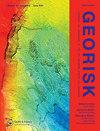Future of machine learning in geotechnics
IF 4.8
3区 工程技术
Q1 ENGINEERING, GEOLOGICAL
Georisk-Assessment and Management of Risk for Engineered Systems and Geohazards
Pub Date : 2022-06-16
DOI:10.1080/17499518.2022.2087884
引用次数: 59
Abstract
ABSTRACT Machine learning (ML) is widely used in many industries, resulting in recent interests to explore ML in geotechnical engineering. Past review papers focus mainly on ML algorithms while this paper advocates an agenda to put data at the core, to develop novel algorithms that are effective for geotechnical data (existing and new), to address the needs of current practice, to exploit new opportunities from emerging technologies or to meet new needs from digital transformation, and to take advantage of current knowledge and accumulated experience. This agenda is called data-centric geotechnics and it contains three core elements: data centricity, fit for (and transform) practice, and geotechnical context. The future of machine learning in geotechnics should be envisioned with this “data first practice central” agenda in mind. Data-driven site characterization (DDSC) is an active research topic in this agenda because an understanding of the ground is crucial in all projects. Examples of DDSC challenges are ugly data and explainable site recognition. Additional challenges include making ML indispensable (ML supremacy), learning how to learn (meta-learning), and becoming smart (digital twin).机器学习在岩土工程中的未来
机器学习在许多行业中得到了广泛的应用,近年来人们对机器学习在岩土工程中的应用产生了浓厚的兴趣。过去的综述论文主要关注ML算法,而本文主张将数据置于核心,开发对岩土数据有效的新算法(现有和新的),满足当前实践的需求,利用新兴技术的新机会或满足数字化转型的新需求,并利用现有知识和积累的经验。该议程被称为以数据为中心的岩土工程,它包含三个核心要素:以数据为核心、适合(和转换)实践以及岩土工程背景。岩土工程中机器学习的未来应该考虑到这一“数据优先实践中心”议程。数据驱动的站点表征(DDSC)是本议程中一个活跃的研究主题,因为对地面的了解在所有项目中都至关重要。DDSC挑战的例子是丑陋的数据和可解释的站点识别。其他挑战包括让ML变得不可或缺(ML至上)、学习如何学习(元学习)和变得聪明(数字孪生)。
本文章由计算机程序翻译,如有差异,请以英文原文为准。
求助全文
约1分钟内获得全文
求助全文
来源期刊
CiteScore
8.70
自引率
10.40%
发文量
31
期刊介绍:
Georisk covers many diversified but interlinked areas of active research and practice, such as geohazards (earthquakes, landslides, avalanches, rockfalls, tsunamis, etc.), safety of engineered systems (dams, buildings, offshore structures, lifelines, etc.), environmental risk, seismic risk, reliability-based design and code calibration, geostatistics, decision analyses, structural reliability, maintenance and life cycle performance, risk and vulnerability, hazard mapping, loss assessment (economic, social, environmental, etc.), GIS databases, remote sensing, and many other related disciplines. The underlying theme is that uncertainties associated with geomaterials (soils, rocks), geologic processes, and possible subsequent treatments, are usually large and complex and these uncertainties play an indispensable role in the risk assessment and management of engineered and natural systems. Significant theoretical and practical challenges remain on quantifying these uncertainties and developing defensible risk management methodologies that are acceptable to decision makers and stakeholders. Many opportunities to leverage on the rapid advancement in Bayesian analysis, machine learning, artificial intelligence, and other data-driven methods also exist, which can greatly enhance our decision-making abilities. The basic goal of this international peer-reviewed journal is to provide a multi-disciplinary scientific forum for cross fertilization of ideas between interested parties working on various aspects of georisk to advance the state-of-the-art and the state-of-the-practice.

 求助内容:
求助内容: 应助结果提醒方式:
应助结果提醒方式:


